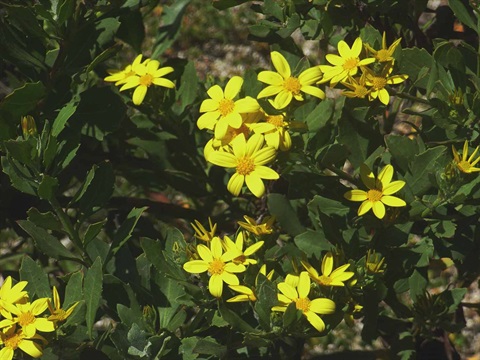Weeds

Weeds are a major problem in the Tweed due to our great growing conditions.
A weed is a plant that:
- is growing where it's unwanted
- is taking the place of desired plants
- has been introduced from another country (or does not naturally occur in the area)
Weeds are a big threat to our unique environment, and could have serious economic and social impacts.
We’re all responsible for preventing biosecurity risks posed by weeds (under the NSW Biosecurity Act 2015).
Weeds in the Tweed
By learning how to identify weeds we can help to manage them.
Bitou bush, tropical soda apple and parthenium are a problem here. By law, sightings of these priority weeds must be reported:
Bitou bush
Bitou bush is a highly invasive weed native to South Africa. It was introduced into NSW to 'rehabilitate' dunes and control erosion on sand mining sites. The entire Tweed Coast falls within the Bitou Bush Biosecurity Zone. Council has almost eradicated this weed on the coast.
Tropical soda apple
Tropical soda apple invades open to semi-shaded areas (pastures, forests, riparian zones, roadsides, recreational areas, horticulture and cropping areas). It has the potential to spread in coastal regions of NSW and Queensland, and inland through cattle movements.
 Parthenium weed
Parthenium weed
Parthenium has recently appeared in the Tweed through contaminated stock feed. Parthenium readily colonises weak pastures, disturbed areas and heavily stocked areas around yards and watering points. Contact with the weed can cause severe allergic reaction.
What is a ‘priority weed’?
Plants that are a major biosecurity risk are called priority weeds.
Sightings of priority weeds must be reported.
Reporting priority weeds
The weed control authority for the Northern Rivers is Rous County Council.
To report sightings of priority weeds (or get help with weed identification):
Reporting priority weeds on Council land
Council is responsible for managing weeds on public land.
To report priority weeds on Council land:
Weeds on neighbouring properties
If you’re concerned about weeds on a neighbouring property, talk to your neighbour.
Council is not responsible for enforcing private landowners to control weeds. Council does not get involved in civil disputes.
Pesticide sensitivity - notify us
Council uses pesticides and herbicides to help manage weed growth in road reserves and on public land.
If you have health or other reasons for avoiding the use of chemicals near your land, you can notify Council by completing a Pesticide sensitivity notification form(PDF, 35KB).